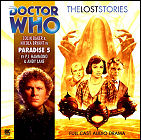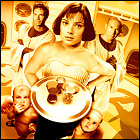 After discovering that an old friend has mysteriously vanished, the Doctor is determined to track him down to an overhyped pleasure cruise, overseen by two men named Michael and Gabriel. Peri is pressed into service as a hostess on the cruise, while the Doctor, trying not to draw attention for once, tags along as a passenger. They both meet almost-must, infant-like creatures called Cherubs, one of whom gives the Doctor a warning: “Beware of the Elohim.” The Doctor is now more certain than ever that his old friend is in trouble, just as the space cruise ship’s officers are certain that their colorful new passenger spells trouble for them.
After discovering that an old friend has mysteriously vanished, the Doctor is determined to track him down to an overhyped pleasure cruise, overseen by two men named Michael and Gabriel. Peri is pressed into service as a hostess on the cruise, while the Doctor, trying not to draw attention for once, tags along as a passenger. They both meet almost-must, infant-like creatures called Cherubs, one of whom gives the Doctor a warning: “Beware of the Elohim.” The Doctor is now more certain than ever that his old friend is in trouble, just as the space cruise ship’s officers are certain that their colorful new passenger spells trouble for them.
written by P.J. Hammond & Andy Lane
directed by Barnaby Edwards
music by Simon RobinsonCast: Colin Baker (The Doctor), Nicola Bryant (Peri), Alex Macqueen (Gabriel), James D’Arcy (Michael), Helen Goldwyn (Stella / Bella), Andree Bernard (Lorelei), Teddy Kempner (Mr. Gelter / Mr. Bliss / Elohim voice), Claire Wyatt (Ms. Aht), Richard Earl (Mr. Tapp / Mr. Winterbourne)
Notes: P.J. Hammond is the creator of the cult classic fantasy series Sapphire & Steel, which intermittently presented Doctor Who with serious competition in the area of messing with timelines and established history. Hammond later went on to pen episodes of Torchwood (Small Worlds, From Out Of The Rain), but this was his first and only attempt to write for Doctor Who. The scripts for Paradise 5 were rejected, with some accounts claiming that John Nathan-Turner was particularly uncomfortable with the story. Paradise 5 was originally conceived as one of the segments of The Trial Of A Time Lord, possibly the first one to feature Melanie, and as the series was already an endangered species following its 18-month hiatus, JN-T may have felt that generating controversy via the use of Judeo-Christian imagery was an unnecessary risk.
Timeline: after The Hollows Of Time and before Point Of Entry
LogBook entry and TheatEar review by Earl Green
Review: The Lost Stories are a genuinely interesting offshoot of the usual Big Finish fare, adapting and presenting – in audio form – scripts that were originally commissioned by the BBC, but which were then abandoned at some stage of development. One thing that lost stories and deleted scenes have in common is that it’s easy to see, sometimes, why they progressed no further.
There’s an interesting plot setup at the heart of Paradise 5, but the incidental characters populating the story – and the story structure that those characters dictate – fit in well with the muddled TV storytelling of the sixth Doctor’s era. The only real standout characters are the anything-but-benevolent Gabriel and Michael, who are fleshed out in a way for this audio production that  almost certainly never would’ve happened circa 1986 (they’re portrayed as a somewhat sadistic, possibly gay couple – that might’ve gotten by today, but in 1986, it’s doubtful).
almost certainly never would’ve happened circa 1986 (they’re portrayed as a somewhat sadistic, possibly gay couple – that might’ve gotten by today, but in 1986, it’s doubtful).
The biggest challenge to the story’s credibility is the notion of the Doctor and Peri going undercover to find out what’s going on. Again, it’s a story from the ’80s, and the sixth Doctor and Peri are definitely characters from the ’80s, each of them colorful, virtually un-ignorable and unlikely to blend in. It’s a gag that worked in the seventh Doctor’s era (The Curse Of Fenric) and the tenth Doctor’s era (School Reunion), but seems a bit unlikely to work with this TARDIS team. (It’s important to remember that the script was originally written with Bonnie Langford’s character of Melanie in mind, rather than Peri, but even in that case, Mel isn’t exactly a character who can go unnoticed either.)
How this would’ve fit into the Trial Of A Time Lord structure is unclear; Paradise 5 was in the running to be Mel’s debut story, but was replaced by Terror Of The Vervoids. It’s hard to judge whether or not a Trial season with Paradise 5 in the running would’ve been more successful, just as it’s hard to judge how well the story fares in audio form. There’s a story here that I want to like, but it meanders off-course with startling regularity – which, I suppose, makes it a perfect fit for the era of the show it’s meant to evoke, just not a conspicuously entertaining relic of that era.
